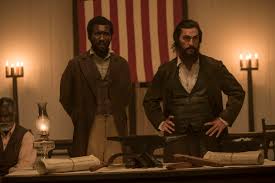Memorials to confederate soldiers have become a point of contention in the past several years. This is something I welcome. The Civil War shook our country up in ways nothing else has. And even after all this time, we haven’t arrived at a consensus about how to remember it. Nothing puts a finer point on this than the confederate memorials. Should they stand to commemorate valiant southern soldiers or brilliant strategy from confederate generals? Or is their existence an affront of the worst order: a celebration of treasonous men who tore the country apart and fought for a cause that would have denied freedom to millions of blacks?
Free State of Jones provided an intriguing perspective on these questions. It is often said that the confederate flag and confederate memorials merely represent southern heritage that we should honor. But, the movie suggests the answer is more complicated. It follows Newton Knight, a southern farmer opposed to slavery who deserts after losing his nephew in the war.
When he gets back to Mississippi and sees the confederate home guard pillaging supplies from civilians, he decides to lead a rebellion of his own–against the rebels. Working with escaped slaves and other deserters, he fights guerilla style for years. At one point, he even tries to work with Union General William Tecumseh Sherman.
Ironically, a confederate memorial stands in in Ellisville, Mississippi, which was “ground zero” for the rebellion in Jones County. The real-life version of Knight supported the Union just as strongly as the fictional version did. He so undermined the tax system in Jones county that the confederacy sent two regiments to take him out. They failed. After the war, he was an ally to blacks, ensuring that masters freed their slaves and fighting the Klan.
Knight was hardly the only white Southerner opposed to the confederacy. By some estimates, in fact, over 100,000 white Southerners fought for the Union. These men were just as “southern” as the men who fought for the rebels. But if you could transport them to today, would we seriously think that men who carried the American flag into battle would consider the confederate flag as representing their heritage?
Holding up the confederate flag as the symbol of southern heritage has always been in tension with the historical record. As you might suspect, it leaves out the 90,000 former slaves who fought in the Union army. Would a Mississippi slave who fled his master to join the Union army really regard the confederate flag as representing his heritage? Would he feel honored that monuments and public places fly it?
The Civil War echoes into our time. The things we were fighting about–racial equality, the proper role of the federal government, etc–are things we still are. As we grapple with how to remember the conflict, I hope we will do so with nuance. On that score, there is no better place to start than recogizing that the oft-overlooked southern unionists are an important part of southern heritage.
